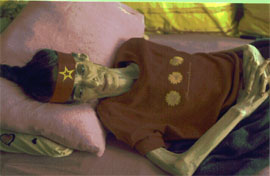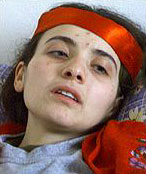The Hunger Strike
34 prisoners and their supporters have died on the Death Fast in Turkey

On October 20th 2000, about 1,000 political prisoners from the organisations DHKP-C, TKP(ML) and TKIP (Kurdish and Turkish revolutionary groups) started a hunger strike. The prisoners are demanding the abolition of the 'F' Type isolation prisons.
Dozens of Hunger Strikers are now approaching death. Thirty Four Hunger Strikers have died in the past few months and many more are now reaching the critical stage. The hunger strikers take sugared or salted water and vitamins to prolong their fast - in this way they can survive, although very weak, for five or six months.
Solidarity hunger strikes are carried on by relatives not in prison and many of these have also died. The dead include men and women and many on protest are just teenagers.
Some Hunger Strikers have been killed, crippled or left with brain damage, as a result of force feeding.
Statement at start of Hunger Strikes - October 27th 2000
Indefinite Hunger Strike in Turkish prisonsDHKP-C, TKP(ML) and TKIP Prisoners TO THE PRESS AND PUBLIC OPINION THE BOURGEOIS MEDIA WILL NOT BE ABLE TO SMEAR OUR INDEFINITE HUNGER STRIKE AND DEATH FAST ACTION WITH LIES AND DISTORTIONS IN THE NEWS
Long live our General Resistance!
As is known, we DHKP-C, TKP(ML) and TKIP revolutionary prisoners, to repel the attacks by the state aimed at introducing the "F" Type isolation cell prisons, went on an Indefinite Hunger Strike which has been in progress since October 20, 2000.
Since the start of our action, the fascist state has resorted to every kind of method and means, striving desperately to obscure our action or smear it. They have recourse to unbelievable lies and demagogy. In order to carry out a provocation against our Indefinite Hunger Strike action and prepare the ground for attacks on the prisons, the fascist state had a section of the mafia gangs it nurtures carry out "incidents" in the prisons, firstly at Adana Kurkculer and then at Istanbul Bayrampasa, taking guards hostage and claiming that this was in support of demands for an amnesty.
In almost all their news reports, the bourgeois media have engaged in lies and distortions to give the impression that the Indefinite Hunger Strike is being carried out to demand an amnesty. By means of such news and statements, the fascist state is obviously aiming to smear our action. But they will not succeed. No lies and demagogy will be able to obscure our action. Because all public opinion knows that never and nowhere have revolutionary prisoners sought an amnesty or refused to resist. Nor is there anything like that in any of the demands we are putting forward now. We revolutionary prisoners have never wanted an amnesty. It is those who are guilty who have need of an amnesty. And the guilty ones are those who have massacred revolutionaries and the people and practised torture - in other words, the fascist state and its henchmen. We had explained the aims and demands of our general resistance to public opinion and to the press. But once again we are taking the opportunity to put forward our demands.
OUR DEMANDS: 1 - The "F" Type prisons must be closed.
2 - The anti-terror law (Article 3713) must be abolished, along with all its consequences.
3 - The protocol signed by the Justice, Interior and Health Ministries and known as the "tripartite protocol" must be abolished.
4 - The State Security Courts must be abolished, along with all the provisions for which they are responsible.
5 - Prisons must be periodically checked by delegations of lawyers, doctors, relatives of prisoners, representatives of non-governmental organisations and the Union of Prison Staff.
6 - Those who are responsible for massacring and wounding dozens of our friends in Buca, Umraniye, Diyarbakir, Ulucanlar and Burdur must be judged and punished quickly and in a way accessible to the public.
7 - All our friends who have suffered from permanent illness, whose health problems have continued since the 1996 Death Fast, who were injured during state operations and denied medical treatment, must be immediately released.
8 - Those who tortured us during detention must be dismissed from their jobs and must be judged and punished quickly and in a manner accessible to the public.
9 - All anti-democratic laws against the struggle of the peoples for freedom and democracy must be abolished, and the oppression of the Kurdish nation and the other national minorities must be ended.
Our demands are very open and clear. We warn the bourgeois media. Do not try to confuse the people's minds with deceitful and false news, do not be the accomplices of this state which has been well proven to be the mastermind behind torture and massacres, and which is adding the cell-type prisons to its list of crimes.
Write the truth, broadcast the truth.
No lies or demagogy can obscure our action!.
We have not gone into the cells and will not go into the cells!
October 27, 2000
DHKP-C, TKP(ML) and TKIP Prisoners
Dying Hunger Strikers Voices go unheard in Turkey
Reuters report: Saturday, 18th May, 2001
By Ayla Jean Yackley ISTANBUL, Turkey
In an airy room overlooking the Bosphorus straits, Zehra Kulaksiz, a pretty 22-year-old college student, counts the days until she dies.
This week she marks the 180th day of her hunger strike to protest against Turkish prison conditions. Two other women and one man are also starving themselves to death in the house; none has much confidence that the government will meet their demands before they die. ``The government does not pay attention to our cause, so I may die before they hear our call,'' Kulaksiz said, speaking slowly, her voice hoarse.
Three women including her sister Canan, 19, have died already in the house in a tough working-class neighborhood in Istanbul with leftist graffiti scrawled on the walls.
Turkey's Human Rights Association says 22 people in all have died in the mass ''death fast'' and 60 others are on the verge of death. Nearly 300 inmates and six family members continue their death fasts in an attempt to force the government to reconsider its plan to move inmates from decaying dormitory-style wards to 11 newly built cell-based jails, which cost $4.5 million each. They say the new penitentiaries will isolate inmates, increasing the risk of torture, which human rights groups say remains unchecked in Turkish prisons.
The government has largely ignored the protesters. Accustomed to Western criticism of its human rights record, Turkey has also shrugged off calls from international groups, including the Council of Europe and Amnesty International, to end the six-month prison crisis. European Union enlargement commissioner Guenter Verheugen urged Ankara this week to accelerate prison reforms. ``Whatever the political views the organizers of the strike may have, the present situation in our view is a cause of concern from a humanitarian point of view,'' Verheugen said.
PROTESTERS BRANDED 'TERRORISTS' - Authorities call the protesters ``terrorists'' and insist the new jails, with modern washrooms, kitchens and courtyards, meet the standards of the EU, which Turkey wants to join. Prime Minister Bulent Ecevit said last month the government would not be pressured by the mounting death toll to roll back changes in the penitentiary system. ``Everybody should know the prisons will not be the headquarters of terrorist organizations again,'' he said. Many of the old wards built inexpensively to hold up to 100 men are run by organized criminals and political prisoners. Gangs recruit new members and smuggle in cell phones and weapons that have been used to stage riots and hostage-taking.Two soldiers and 30 inmates died in December when security forces stormed jails across the country to end the standoff. Since then, the hunger strike has largely fallen off the public agenda and Turkish newspapers give scant coverage to the deaths in a country preoccupied with a severe financial crisis. ``The Turkish public isn't clairvoyant,'' Jonathon Sugden of New York-based Human Rights Watch said. ``There has been a very efficient news blackout, with only the government providing information about prisoners, and it has not been forthcoming.''
The Justice Ministry declined requests for an interview. Parliament amended an ``anti-terrorism law'' May 1 to allow some political prisoners access to communal areas, but Sugden says inmates' families report that no prisoners have yet benefited from the new rule and the lockdown continues. ``They should be doing everything they can during this critical time to show those on the hunger strike they are moving in the right direction,'' he said. ``Instead there has been complete idleness.''
PROTESTERS'S DEMANDS VARY - Kulaksiz, whose uncle is on hunger strike in prison, says the death fast is her last resort. Turkish authorities arrested hundreds of sympathizers at street protests last year. The first hunger strikers started their protest Oct. 20 and have prolonged their lives by consuming liquids, sugar, salt and vitamin tablets. Most belong to radical leftist groups, and their demands range from ending isolation in the new prisons to broader human rights. A few have even called on Ankara give up its crisis remedy pact with the International Monetary Fund.
``I want all Turks to be able to enjoy the bounties of Anatolia, to enjoy its fruit, its sun, its factories,'' said Hulya Simsek, 38, who had refused food for 179 days as of May 17 and shares a room with Kulaksiz. Simsek rails against the IMF, globalization and Turkey's bourgeoisie and spends her days reading poetry and drawing pictures, which hang on the walls of the concrete house. ``I want everyone to live life like in these pictures,'' she said, her words slurring. She complains that her muscles ache constantly and she suffers from insomnia.
Cagri Temucin, a member of the Ankara Chamber of Physicians, which has been monitoring the condition of about 60 hunger strikers in hospitals, says many are exhibiting symptoms of Wernicke-Korsakoff syndrome, including hallucinations, memory loss and childlike behavior. Temucin says doctors are ethically bound not to treat those who refuse it. Some of the men weigh as little as 65 pounds. ``The situation is out of our control. It's a painful tableau to see so many people dying when we cannot stop it,'' he said.
Kulaksiz, who has pictures of her late sister on the walls of her room, is unable to walk and goes outside in a wheelchair to sit in the sun. She says she is not afraid to die. ``I want to live, just as anyone else. I love life,'' Kulaksiz said softly. ``But I know if I die I will save hundreds of lives. With each death, our voice becomes louder and eventually I believe the government will hear us.''
Updated information in News from Turkey Section
